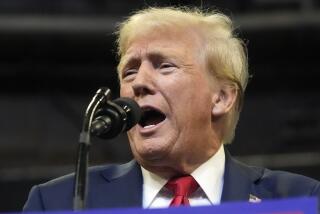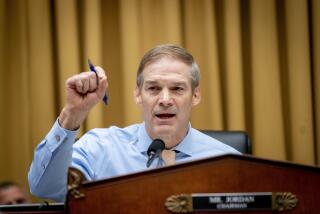Hillary Clinton tries to end controversy over private email account

Former Secretary of State Hillary Rodham Clinton discusses the use of a personal email account.
- Share via
Reporting from Washington — Hillary Rodham Clinton insisted Tuesday that she had broken no rules by using a private email account to conduct government business as secretary of State, even as she disclosed that her aides had deleted more than 30,000 emails that she deemed personal.
While she sought to quell a controversy that threatens to mar the debut of her expected presidential candidacy, Clinton may have only fueled it with a 20-minute news conference — her first in two years — that raised fresh questions about her actions.
Insisting that her approach was fully consistent with administration rules, she said she would not allow investigators from Congress to examine the private computer server that processed and stored the emails at her home in Chappaqua, N.Y.
The former senator from New York said the server had been installed to ensure digital security for her husband, former President Clinton. She said it was still guarded by the Secret Service and had never been hacked.
Nonetheless, she said that last fall she approved the destruction of slightly more than half of the emails she wrote or received as America’s top diplomat during President Obama’s first term — because they were “private and personal.” The remainder were forwarded to the State Department.
“No one wants their personal emails made public,” Clinton told reporters who packed a hallway outside the United Nations Security Council after she had delivered a speech at a conference on empowering women. Two dozen TV crews ensured her comments ran live on several networks.
Clinton said the deleted messages included private emails with her husband, or involved personal matters like her yoga classes or planning for the 2010 wedding of their daughter, Chelsea, or the 2011 funeral of her mother, Dorothy Rodham.
So far, polls indicate the controversy has done little to shake the former first lady’s standing among Democratic voters, who overwhelmingly support her all-but-announced bid for the White House.
Many were quick to dismiss the criticism as a stew of partisan smear and media hype, even as critics delighted in reviving her family’s mine-strewn political history and her penchant for secrecy and hunkering down.
Yet her comparatively laggard reaction to the storm, allowing more than a week to pass before she offered a substantive response, contributed to concerns among Democratic Party professionals that her political operation had gone rusty or was maladapted to the 24/7 demands of today’s campaign world.
Facing scores of clamoring reporters, her demeanor was crisply efficient, even if her smile sometimes seemed forced. She answered fewer than a dozen questions — several of them multi-part — before gathering her papers and leaving.
In her comments, Clinton said she now regretted relying on a private email account while in office, rather than a government account, as recommended in Obama administration policy guidance. She said she used the private account “as a convenience” so that she didn’t need to carry separate phones for personal and official communications.
“Looking back, it would have been better for me to use two separate phones,” she said.
“I thought one device would be simpler; obviously, it hasn’t worked out that way,” she added.
She said she had never sent any classified material on the private account, using other staffers’ government accounts for that.
According to a nine-page statement later put out by Clinton’s office, her private email account held 62,320 messages that she had sent or received between March 2009 and February 2013.
The statement said 30,490 of these were provided to the State Department, and 31,830 were private records that were destroyed.
Her use of a private email account “was widely known to the over 100 department and U.S. government colleagues she emailed, as her address was visible on every email she sent,” the statement said.
“During her time at State, she communicated with foreign officials in person, through correspondence, and by telephone. The review of all of her emails revealed only one email with a foreign (UK) official.”
Clinton said that her emails complied with government record-keeping and archiving regulations because she sent most of her work-related messages to government employees on their government accounts. Those emails would have been “captured and preserved” on the recipients’ systems, she said.
She asserted that government rules allowed every federal employee to judge which emails are personal and can therefore be deleted — a claim that some Republicans challenged.
Clinton did not shed light on which State Department officials, if any, had approved her plan to use her personal account or had assessed its security arrangements. She insisted that her practice was consistent with that of her predecessors, many of whom also used private email.
Critics maintain that the system enabled her to control which emails the government could copy for later public disclosure.
State Department spokesperson Jen Psaki said officials would review all 55,000 pages of emails forwarded by Clinton and ultimately post them on a website.
“We said we expect the review to take several months; obviously that hasn’t changed,” Psaki said. About 300 emails already given to the House committee investigating the attack on the U.S. diplomatic mission in Benghazi, Libya, will be released sooner, she said.
Psaki said that the previous three secretaries of State had responded to the department’s request to turn over any work-related emails they had sent using private accounts.
Madeleine Albright, who held the job during Bill Clinton’s second term, said she did not use email during her tenure.
Colin L. Powell, who headed the department during the President George W. Bush’s first term, said he had used a private email account for some State Department business but had not printed hard copies of any messages and no longer had electronic access to them because the account had been closed.
Condoleezza Rice, Bush’s second secretary of State, said she “did not use personal email for official business,” Psaki said.
Clinton called her delivery of more than 30,000 emails to the State Department “unprecedented” and predicted that most Americans would sympathize with her approach.
Republican lawmakers have been insisting that she release all of her emails, turn over her hard drive or allow inspections of the server. Others have pressed her to appoint an independent arbiter to decide which emails should be released publicly.
But with her deletions, Clinton cut short that debate.
Clinton said that when she and her staff reviewed the emails last year, she instructed her lawyer to err on the side of turning over anything that might be considered work-related. But that did not satisfy critics, because it meant that her team was the sole judge of what was released.
Rep. Trey Gowdy (R-S.C.), chairman of the House panel investigating the Benghazi attack, demanded access to the server.
“Without access to Secretary Clinton’s personal server, there is no way for the State Department to know it has acquired all documents that should be made public,” he said in a statement. The private email account was first uncovered by his panel’s investigation.
Michael Steel, spokesman for House Speaker John A. Boehner (R-Ohio), said Clinton “didn’t hand over her emails out of the goodness of her heart. She was forced to by smart, determined and effective oversight” by Gowdy’s committee.
Twitter: @markzbarabak
Richter reported from Washington and Barabak from San Francisco. Special correspondent Haller contributed from the U.N.; Times staff writer David Lauter contributed from Washington.
More to Read
Get the L.A. Times Politics newsletter
Deeply reported insights into legislation, politics and policy from Sacramento, Washington and beyond. In your inbox three times per week.
You may occasionally receive promotional content from the Los Angeles Times.












